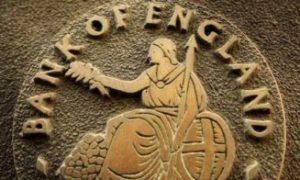It’s the money, stupid
Alan Ecob
As Bill Clinton famously said in order to win an election, “it’s the economy.” But surely today, he’d have to say “it’s the money”. Why? Because of our continuing failure to understand the relationship between money, credit and debt. The main contributor to this failure has been the Bank of England. And it’s not been alone. As Galbraith said, “it is to banking as St. Peters is to the Faith”. So all the rest have followed suit.
The crucial moment in modern time occurred in London in the early 1930s. An official Enquiry had been convened to consider the causes of the ‘Great Depression’. Major Douglas had submitted his A + B theorem, along with an account of money creation. But then, a director of the Bank swore on oath that “the Bank did not create money”. This ended the matter, and it has remained buried until perhaps now.
However, as John Kelly explains in his June 3 article [1], we now have the extraordinary position of the Bank of England, in its own working paper No.529, explaining that banks do create money. Indeed, practically all of it.
Except that what we think of as the ‘money’ they create is really credit with concomitant increased debt. How come? Well, there is an important legal sense in which the only ‘proper’ money is legal tender – banknotes and coins. It actually exists. The rest, 99.9% of global funds, is only book entries as title to money. It is not tangible, resting ultimately only on societal confidence.

An interesting question is – has the Bank really ‘blown the whistle’ on itself? Has it changed its spots? Has its Board of Directors become so concerned as to the significance of our global money system in fostering the ruin of our global environment that it has become prepared to do so? There is an alternative possibility. On p364 of his General Theory of Employment, Interest and Money [2], John Maynard Keynes states:
“Their method was to dismiss the problem from the corpus of Economics not by solving it but by not mentioning it. It altogether disappeared from controversy . . . ”
It is not an exact parallel, but one can grasp the idea. The working paper itself comprises 43 pages (plus several pages of references) of intensely detailed and often abstruse mathematical argument. This, it would seem, is required to acceptably and professionally argue what is made clear in the essentially simple, seven line Abstract. No wonder, as Kelly points out, only a handful of professionals have taken up the matter. And, under the pressure of established professional opinion, to name the four most major areas of our fiscal and monetary concerns in Australia as merely being ‘redundant’ is to be remarkably tactful rather than telling our position as it really is – grossly distorted and in many aspects outright wrong, affecting every Australian citizen negatively.
What does this all mean for our future? The reality is, that money should not be a constraint on our national development. But as Kelly succinctly states the matter:
“If you are hoping that government will now see the light and embark on a stimulus package to get people back to work, don’t hold your breath. Old habits die hard . . . ”
Yet with Malcolm Turnbull as our new Prime Minister, ‘Hope not Nope’ has become Chris Uhlmann’s evaluation of his forward vision. If we get our understanding of money sorted out, ours could become a world of exciting opportunities. In our northern areas, we have land, water and sunshine. Why not assist groups of refugees such as the present twelve thousand Syrians and assist them to build new lives for themselves on a ten-year contract basis? Not in our already overcrowded cities, but up north, producing real and marketable product such as food.
Successful groups could be offered citizenship.
There’s just one thing more. To keep track of such initiatives and more, we’d need to establish proper National Cost and Management Accounting by consolidation of sector accounts to complement then replace the present SNA 5204.0 rubbish. How and why this is necessary – that’s another story.
Source: The AIM Network, 18 Sept 2015 http://theaimn.com/its-the-money-stupid/
References:
Alan Ecob is an ERA member, and has been an FCPA since 1984, but the story of his attitude to money began in 1961. The then burgeoning recession threatened his employment, creating a wish to foresee what the future really held. But on referring to our National Accounts, he found they were (and continue to be ) junk. So he worked it out his way. He thought his findings were going to change the world for the better within 6 months. He was jumping with enthusiasm. But, 54 years later, nothing had changed — until he read a repeat in the ERA Review (v7, n4) of John Kelly’s Bank of England article. Wow! The above article is his response.






























